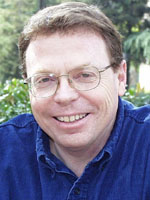
David A. Tirrell
California Institute of Technology
Time to Come Clean
I begin with a confession: I attended my first Gordon Conference lecture “illegally.” I was a first-year graduate student at the University of Massachusetts in Amherst, and I noticed a lecture on the program of the Polymers Gordon Conference that I really wanted to hear. I did not know anything about Gordon Conferences, but I did know that I was not registered for the meeting. I drove up to New London, New Hampshire; found Colby-Sawyer College; and figured out where the lecture room was. My plan was simple: the lecture I was interested in was scheduled right after the morning break; I would wait until everyone returned to the lecture room and the lights went down, and then I would slip in the back door. Surely no one of consequence would be sitting in the back of the room, and I could slip out again, unnoticed, as the lecture ended.
I was almost right. The lights went down, I slipped in, and I quickly found a stool (yes, a stool) against the back wall. Because my eyes were not yet adjusted to the dark, I could not see anyone around me for a minute or so. As my neighbors gradually materialized, I noticed that everyone (except me, of course) was wearing a name tag–a very large and very visible name tag that identified them as legitimate conferees. As I looked more closely at my neighbor to the left, I made out his name: Walter Stockmayer! Convinced that my career in polymer chemistry was over before it had begun, I turned slightly to my right and listened as best I could to the lecture I had come to hear. In the end I did slip out, probably unnoticed, and returned to Amherst. I remember almost nothing about the lecture, but I remember vividly my first encounter with Walter Stockmayer more than thirty years ago.
My second encounter with Professor Stockmayer also came at the Polymers Conference a few years later. This time I was an assistant professor at Carnegie Mellon University (CMU) and properly registered for the meeting. This was one of those interactions that the Gordon Conferences are famous for and that probably would never have occurred anywhere else. We were leaving the lunchroom, about to enjoy a free summer afternoon. “Stocky” asked the usual questions about what I wanted to do in my research program at CMU, and his interest seemed so intense and so genuine that I left with a new sense of confidence that perhaps there was something worthwhile in my research.
Another such meeting happened at about the same time. Norbert Bikales was the director of the polymers program at the National Science Foundation and a regular contributor to the Polymers GRC. Norbert made a point of seeking out the young people in the field to be sure that he knew what they were doing and that he could provide whatever support was appropriate. Norbert was helpful to me in many ways over the years, but what I remember most clearly about our conversation at GRC was his asking, “How long do you think you will work on this project?” I had never considered such a question; I was just thinking that the work would go on indefinitely. In fact, it went on for only a few more years, and my laboratory was soon moving in different directions.
One aspect of the Gordon Conference operation that has served the macromolecular chemistry community (and the broader scientific community) well is the willingness of GRC leadership to start new conferences when they are justified and to terminate them when they are no longer needed. For example, polymer chemists and physicists began moving into many new areas in the 1970s as interest grew in various kinds of special polymers, and new Gordon Conferences provided critically important venues for discussion of these new research directions. But conferences must also show evidence of real vitality in order to justify continued GRC support. The willingness of GRC leadership to demand evidence of excellence, to seek advice and criticism from the scientific community, and to subject conference activities to continuous, candid review has been a key element of the remarkable seventy-five-year history of the Gordon Research Conferences.